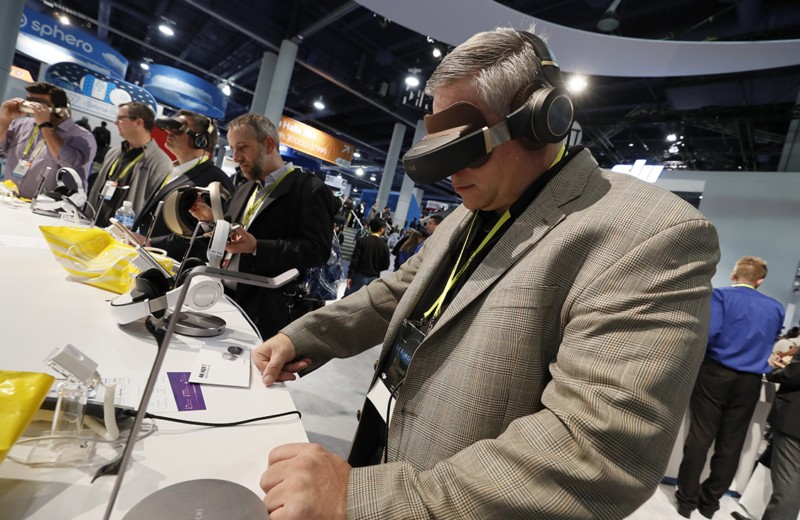The world’s biggest tech show this year, CES 2017, introduced lots of promising new startups and went hands-on with new gadgets, from Kuri the robot, a wearable pollution tracker, digital toaster to a smart breast pump.
Last year was a record-breaking year for CES 2016, with attendance of 177,393 people from across the globe that came to experience technology innovation spanning 2.47 million net square feet of exhibit space in Las Vegas, Nevada.
And even though statistics for CES 2017 are not available yet, it seems that the number of hardware companies presented there increased this year.
Ukraine was represented by 20 startups at the event held Jan. 5 – Jan. 8. UVCA and Wnisef selected and brought to the U.S. eight of them, eating a separate Ukrainian pavilion to promote the country’s information technology sector.
“Ukrainian startups are very competitive,” Olga Afanasyeva, the UVCA executive director, told the Kyiv Post. “We weren’t anyhow ashamed by their level.”
Oleg Naumenko, the CEO of Hideez, one of Ukraine’s startups brought by UVCA to the show, says the CES has helped generate new ideas and is a perfect place for networking.
“Of course, (the fact that there were) 20 projects from Ukraine and 200 from France show the difference in scale, but believe me, quality, business logic, innovativeness of our projects even outdo Western analogues,” Naumenko told the Kyiv Post.
Here’s what Ukrainian companies showed:
Raсcoon.world

Raccoon Technologies Inc. has developed an interaction gadget for games in virtual or augmented realities. The device is basically a pair of gloves that “feels” virtual objects. Each glove works independently. Racoon says their gadget can work with 3D objects as with real ones. This may open new opportunities for those who work with augmented and virtual realities.
Ecoisme

Ukrainian startup Ecoisme has developed household sensors that look like wireless internet routers.
But these are certainly not just routers – these devices track energy usage by appliances, such as refrigerators, or by lights in the house. The data are sent to users’ smartphones along with energy-saving tips.
The company has used CES to collect additional pre-orders to start mass production promised back in 2015 after a successful campaign on crowdfunding platform Indiegogo, which was supported by 598 pledgers. During the exhibition, Ecoisme showed a good performance on Product Hunt.
Wider

Wider LLC develops a 130-inch screen that can be easily transformed, for it even rolls. And it’s not just a screen. The whole device consists of a panoramic solid display with contour lighting, computer, Hi-Fi.
The device is compatible with any telecoms equipment.
Hideez Key

Startup Hideez has developed a device that can remember up to 1,000 digital passwords, making sure only the Hideez device owner can access all of their gadgets and online accounts.
Hideez Key consists of a key fob and a mobile app, which pair via Bluetooth 4.0 or higher. The device stores passwords for websites and apps visited from a paired device, and at the next visit it enters the relevant password for the user at a click of the fob’s button.
Apart from storing passwords, the fob locks devices’ screens if it moves a certain distance away from them, and unlocks them when it comes back in range and can also open doors closed with RFID readers – the kind usually installed in garages, building entrances, offices, and various types of lockers.
At CES 2017, Hideez has presented a working prototype of its next product, Hideez Key 2. The new gadget has multiple RFID storages and a new form – it transforms into a bracelet or pendant.
Luciding

Tech company Luciding Inc., which has probably the most controversial reputation in the Ukrainian IT industry, develops the wearable with sensors that are supposed to help its owners to control their dreams.
It analyzes brain waves and detects when its wearers enter a phase of fast sleep (REM) and let them understand that they’re dreaming.
SolarGaps

SolarGaps has created a device that combines solar panels with venetian blinds to allow those who live in apartments to generate their own electricity.
Simple plug in, and solar energy starts to power household devices. Once installed on a window, the smart blinds with built-in solar panels can generate over 100 kilowatt of energy a month – that’s around the energy amount consumed by one Ukrainian citizen monthly.
The energy can be stored with nearly any battery storage and serve as an emergency backup.
TechNovator

TechNovator promises to “free the world from charging wires.”
The company develops a wireless charging system that works over distances of up to 17 feet. The only requirement: A smartphone have to be enclosed into a special case and it should be in range of the plugged in base.
Electromagnetic waves charge the phone over the distance.
Kyiv Post staff writer Denys Krasnikov can be reached at krasnikov@kyivpost.com.



